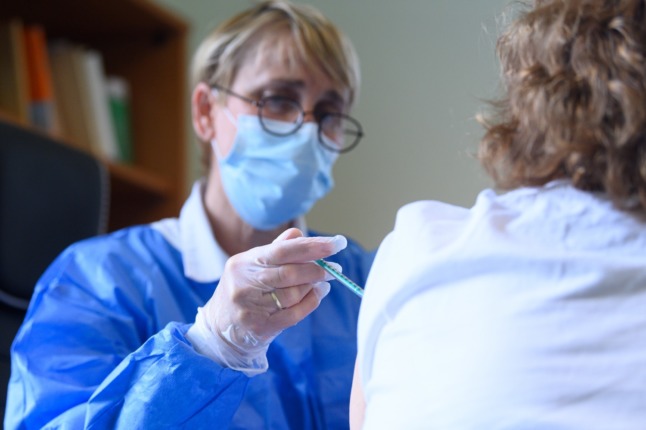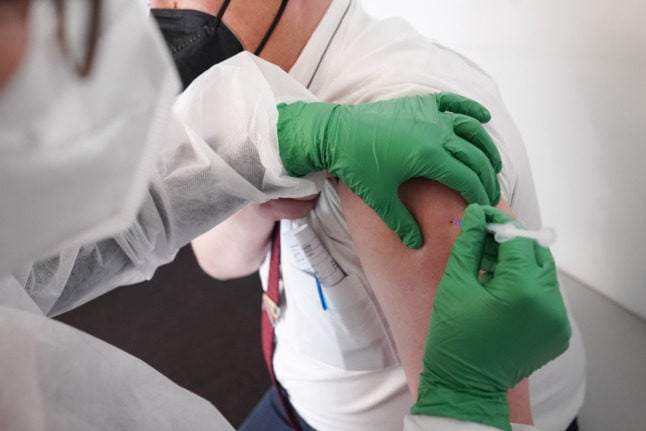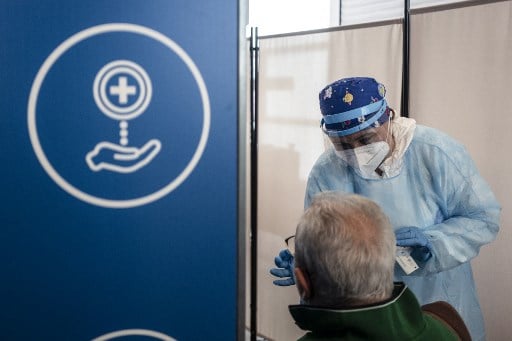After a slow start during the first few months of 2021, Germany’s vaccine campaign is picking up speed, with over 40 percent of the population having had at least one jab, according to the latest data.
It helped that GPs began vaccinating German residents at the beginning of April. Since then the country has opened up vaccines with manufacturers AstraZeneca and Johnson & Johnson to anyone who wants one through their GP or specialist – although there are often long wait times.
READ ALSO:
- Germany makes J and J vaccine available to all adults: What you need to know
- Germany gives green light to offer AstraZeneca vaccine to all adults
We break down who is currently eligible for shots at both Germany’s official vaccination centres, as well as through GPs and specialists. In some states, priority vaccinations through all manufacturers at these practices have been waived completely.
In addition to AstraZeneca and J and J, it’s also possible to receive a vaccine through BioNTech/Pfizer and Moderna.
Who is among those eligible for Covid vaccination?
Group 1: Highest priority: including those over 80 years old, staff in intensive care units, emergency rooms and ambulance services, as well as nursing homes staff and residents.
Group 2: High priority: This includes those over 70-years-old, people with dementia or down syndrome, transplant patients, and staff in daycare centres (Kitas) and elementary schools
Group 3: Increased priority: Including people over 60 years of age, people with medical conditions, police, firefighters, food store personnel and other professions which work intensively with the public.
READ ALSO: Here’s the German vocabulary you need to get the Covid-19 vaccine
Here’s a breakdown of who qualifies for the vaccine in each state:
Baden-Württemberg
Vaccine appointments in the southwestern state are available for anyone over 60, as well as for all in priority groups 1 and 2, and parts of the third priority group. Since May 17th, doctors can give out all jabs without priority. A complete listing of those eligible for a jab can also be found on the state’s website.
Bavaria
Prioritisation in doctors’ offices for all licensed vaccines has been lifted since May 17th. Priority groups 1-3 can receive their jabs at vaccination centres. You can find more information on the southern state’s website.
Berlin
In Berlin, booking appointments for vaccination against coronavirus is also possible through priority group 3. A booking code is no longer necessary and appointments can be booked online through Doctolib or by phone. As of May 17th, the city-state lifted prioritisation in GPs for all vaccines, but prioritization still applies in vaccination centres. Visit the KV Berlin website for more information.
Brandenburg
In Brandenburg, priority groups 1 and 2 qualify for a vaccine, but some people in priority level 3 also now qualify. People over 80 years of age also receive a personal letter by mail inviting them to be vaccinated, and containing a special phone number for making an appointment. You can find more information on the Brandenburg vaccination portal.
Bremen
Vaccination for people 60 and older in the northern city-state is available in vaccination centres. Bremen gives vaccination-eligible residents an invitation letter containing a personal code, which can then be used to make an appointment online. For more information, visit the state’s website.
Hamburg
In the harbourside city-state, people over the age of 70, as well as at-risk groups, can currently register for their jabs at official vaccination centres. Certain occupational groups such as teachers, police officers, the fire department or food retailers can also make an appointment.
People with down syndrome, epilepsy or certain mental disorders are also eligible for vaccination. As of May 17th, people with other special pre-existing conditions can also sign up. More information can be found on Hamburg’s state website.
Hesse
In Hesse, vaccines will be possible for all adult residents starting June. It’s currently possible for groups 1 through 3. People eligible for vaccination can register online or by phone, and subsequently the dates will be given by post or email. Current information can be found on the state’s website.

A doctor in Dresden vaccinating a patient. Photo: picture alliance/dpa/dpa-Zentralbild | Robert Michael
Mecklenburg-Western Pomerania
The northwestern state is currently calling on groups of people from priority levels 1, 2 and 3 to be vaccinated. All those eligible for vaccination should contact their primary care physician or make an appointment at a vaccine centre. More information is available on the state’s website.
Lower Saxony
Vaccine registration is currently possible for those who belong to prioritisation group 1 or 2. If no more appointments are available at the vaccine centre, those eligible can be placed on a waiting list. People 60 and older may also be placed on the waiting list for vaccination for the AstraZeneca vaccine. Further information can be found on the state’s website.
North Rhine-Westphalia
NRW currently allocates appointments for vaccines for priority groups 1 through 3, at both vaccine centres and at GPs. Find more information here. However, locally there may be some differences with some regions only offering some of priority group 3 appointments currently.
READ ALSO: Why are some parts of Germany still not vaccinating people in their 60s?
Rhineland-Palatinate
Currently, in Rhineland-Palatinate, all people in priority groups 1, 2 and 3 can be vaccinated against the coronavirus. Registration is done by phone or online. It is possible to arrange a group appointment for up to two people who will both be vaccinated with the same vaccine. More information can be found on the state’s website.
Saarland
In the small state of Saarland, all people in priority groups 1, 2 and 3 are eligible for vaccination, and can register online or by telephone. Those whose jobs or health conditions place them in one of the priority groups will receive a code from their doctor or employer certifying their eligibility for vaccination, which must be presented before they can sign up. Pregnant women may also receive up to two additional contact codes. More information is available on the state’s website.
Saxony
In Saxony, people who belong to prioritization level 1, 2 or 3 can currently register for a vaccine. As of May 24th, prioritisation was lifted in physicians’ offices, but will remain in place vaccine centres. More information is available on the state’s website.
Saxony-Anhalt
Vaccines are available for people in priority groups 1, 2 and 3. More information can be found on the state’s website.
Schleswig-Holstein
Germany’s most northern state is currently vaccinating priority groups 1-3. Available dates are dependent on the limited amount of vaccines the state receives. More information can be found on its website.
Thuringia
People with priority levels 1, 2 and 3 are eligible to get their shots in vaccine centres or at physicians’ offices. If the “indication by occupation/occupational group” applies to you when you make your appointment, you should be sure to bring proof from your employer. More information is available here.
READ ALSO: What is Germany’s new digital vaccination passport and how do I get it?




 Please whitelist us to continue reading.
Please whitelist us to continue reading.
No Bavaria?
Thanks for catching that, Max! Bavaria is now included, bringing it to 16 states.